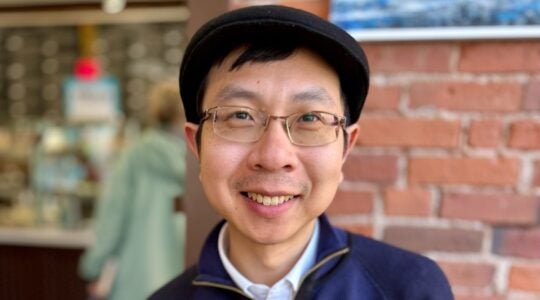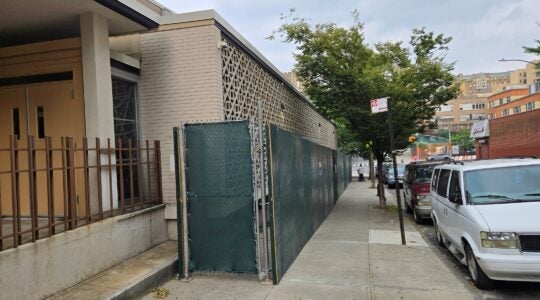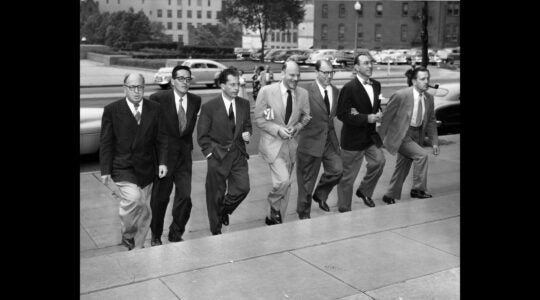Aaron Spool used to have a lot of trouble sleeping.
A father of three young children, with another on the way, Spool — who lives in West Orange, N.J. — was kept up at night worrying about yeshiva tuition.
“For me, paying for day school is impossible. I have an MBA from the University of Michigan and work in finance, and I just can’t do it,” he told The Jewish Week. “If I can’t, then everyone else is going to have an issue, and I wanted to get ahead of the curve, to be proactive instead of reactive.
“I don’t want to be, oh, two kids in and we didn’t get a scholarship, so do I take another mortgage out?”
Determined to find a solution that wouldn’t compromise his children’s Jewish education, he began brainstorming with friends around the Shabbat table.
While Spool and his friends considered trying to start a Hebrew charter school, the logistics seemed daunting, and “I kept coming back to what I really wanted: a top day school that’s affordable.”
This fall they are opening the West Orange Cooperative Yeshiva, which aims to keep tuition to a minimum — just $8,000 — by having parent volunteers do much of the administrative and other non-teaching work.
The Modern Orthodox school, which will open with a kindergarten and first grade, adding more grades each year, is not the only (or even the cheapest) low-cost day school starting in New Jersey. Just 40 miles away in East Brunswick, the Pre-Collegiate Learning Center of New Jersey — a pluralistic Jewish high school slated to open this fall — will charge just $5,000 a year, a fraction of the tuition at most private high schools. Meanwhile, a planning group in Teaneck is working to establish a low-cost yeshiva that would open in September 2012.
All of this, of course, is separate from the state’s tuition-free Hebrew charter schools — Hatikvah in East Brunswick, which is finishing its first year; Shalom Academy in Englewood, which is slated to open this fall (although its charter is being legally challenged and it does not yet have a location); and Tikkun Olam, a would-be high school whose charter application this year was rejected, but which plans to re-apply. (Shalom Academy’s charter application was rejected three times before winning approval in January.)
While West Orange Cooperative Yeshiva is keeping costs down by enlisting parent volunteers and, thus, eliminating all paid administrative positions, PCLC-NJ is enlisting technology. The school, which has received a $50,000 start-up grant from the Avi Chai Foundation, is the first Jewish day school — and possibly the first school ever — to be created with this type of “blended learning” approach: the combination of traditional classroom teaching in a bricks-and-mortar space with online classes.
Which is not to say that it’s an “Internet high school,” insists Lauren Ariev Gellman, PCLC-NJ’s board chair, president and director.
“People have this vision that kids will be at home on the computer all day, and that’s not what it is,” said Gellman, a former book editor whose husband Peter, a Princeton professor turned investment manager, is also on the board.
PCLC-NJ’s Judaic studies classes will all be “live and on-site,” although students — such as “a kid who is so good at Gemara he or she has to sit with a rabbi in Israel” — will have the option of pursuing advanced studies with a tutor via Skype.
Foreign-language classes will use Rosetta Stone software, but also have in-person weekly conversation groups. Similarly, math and science classes will use Thinkwell “video textbooks,” but with the addition of tutoring services and an on-site teacher who will lead discussions and labs.
And prayer services? Students will be required to attend morning minyan at the synagogue of their choice. As the school’s website explains, “In this way, students can daven in an environment which is personally meaningful to them while at the same time helping to support the various minyanim, which can always use a few extra people.”
Located in a local Conservative synagogue’s Hebrew school wing, the PCLC-NJ will be open from 8 a.m. to 4 p.m., and in addition to featuring standard classrooms, will also have “common rooms” where kids can work individually on laptop computers or team up on group projects.
Students will be assigned a “coaching/mentoring team” of adults who will meet with them individually, help them choose courses and make sure they are staying on top of their assignments.
In addition, teachers, parents and the coach/mentors will have access to the student’s online “portal,” where course syllabi, papers, homework and other materials are stored.
The hope is that, if successful, the high-tech school — Gellman describes it as an “open-source venture” — will inspire the creation of similar Jewish high schools around the country.
As with the West Orange Cooperative Yeshiva, the so-called “tuition crisis” has been a driving force behind the creation of PCLC-NJ.
However, perhaps even more important for the Gellmans was their desire to offer more individualized, customizable learning.
The two had long been interested in education. Peter is a former consultant for school reform initiatives of the Hudson Institute, a think tank/policy research organization, and a former board member of the Solomon Schechter Day School of Raritan Valley. Lauren was one of the founders of Yeshivat Netivot, a Jewish Montessori school in Edison, N.J., which their youngest daughter currently attends. Their middle daughter will be in the eighth grade at PCLC-NJ this fall.
The couple home-schooled their oldest daughter for five years and ended up enrolling her in Stanford EPGY, an online international high school for gifted students.
“In the course of all this, we talked about education a lot and started formulating an idea for what was going to become the Learning Center,” Lauren said. “Two years ago we looked at each other and said, ‘This is going to happen, and we’re the people to do it.”
That said, the low tuition — and the fact that a nearby Jewish high school is closing while another is struggling — has been a draw for many parents. The school expects to open with between 15-20 students.
Ivy Spears, an optometrist whose twin daughters will be transferring from Shalom Torah Academy to PCLC-NJ’s eighth grade, said that the new school is “charging less than half what the others are charging” and “may revolutionize all private education.”
“The private schools are not sustainable, because no one can afford that kind of tuition,” she said.
While she and her daughters were skeptical at first about the online aspect of PCLC-NJ, they decided it’s “certainly worth a try.”
“If it works, it’s the beginning of something really exciting. If it doesn’t work for our children, we still have time to find a four-year high school program for them.”
Like PCLC-NJ, the West Orange Co-operative Yeshiva has avoided capital expenses by locating itself in classroom space rented from a local synagogue. (The low-cost yeshiva under discussion in Teaneck is also exploring the possibility of using synagogue space.)
Although WOCY is Orthodox, a Conservative congregation — Beth Ahm — is leasing space to it at below-market rates.
Just how does a cooperative school work?
While the classroom teachers are paid professionals — the kindergarten teacher, Lea-Nora Kordova, has more than 30 years of day school teaching experience — parent volunteers are running the administration. One parent, Barbara Hollander, is a professional curriculum developer and math teacher, and is developing the school’s math curriculum.
Each family is expected to volunteer at least 40 hours a year — whether writing grant proposals, chaperoning field trips or helping out in the classroom.
“Everyone’s required to help, and if you can’t pay [full tuition] in cash, you pay in time, you pay in help, in something the school needs,” Spool said. “We have to pay the teachers, pay for liability insurance and the facility cost, but almost everything else can be volunteered.”
The new school is also looking to The Jewish Cooperative School in Hollywood, Fla. — the only other known cooperative day school in the United States — as a resource.
That school, which has a kindergarten and a first grade so far, started two years ago as a four-child pre-K operating out of a private home. Next year, it expects to have about 20 families, with children in grades K-2. Class size is limited to 10 children.
Janessa Wasserman is a founder and volunteer administrator of the Orthodox school; her responsibilities include collecting the $7,500 tuition from parents, making sure the teachers get paid and making sure that parents put in the required four hours of work each month. Parents can opt to “buy out” of the work responsibilities, but so far none have. While many contribute by helping out in the classroom or office, one provided free professional services to a nature educator, who in turn teaches weekly nature classes.
“One thing we consistently hear from people that come and visit the school is that it’s just so happy,” said Wasserman, who has two daughters in the school. “The kids are happy, the teachers are happy — it’s unlike anything out there. And they’re learning at an amazing rate.”
While money was not the only reason for starting the Florida co-operative — the founders also wanted something more personalized and with a lot of parental involvement — Wasserman said it was definitely a factor and continues to be a draw.
“When you’re half what the other local schools are requiring, it gives people a light-at-the-end-of-the-tunnel kind of feeling,” she said.
The New York Jewish Week brings you the stories behind the headlines, keeping you connected to Jewish life in New York. Help sustain the reporting you trust by donating today.




